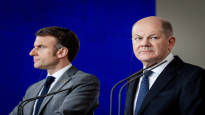French President Macron and German Chancellor Scholz are trying to keep the EU on course, but it has become difficult, Europe correspondent Anna Karismo writes.
Anna KarismoEurope correspondent
BERLIN The moment was symbolic.
President of France Emmanuel Macron stood on Monday in the evening sun in Dresden, Germany, in front of the Frauenkirche and gave a speech to the youth about the importance of European unity.
The Chancellor of Germany was standing in the same place Helmut Kohl in 1989 with more or less the same thing – to emphasize the unity of nations.
At that time, however, the church was still in ruins, after the Allies had bombed it to the ground in February 1945. It was rebuilt to its old glory only after the reunification of Germany.
Many East Germans remember Kohl’s historic speech in front of the stone pile in Frauenkirchen. There he said that he was striving for the unity of Germany.
Kohli had to balance. He later revealed that he did not want to disappoint the hopes of the East Germans and, on the other hand, to frighten the Allies with overly nationalistic speech. In Moscow, Paris and London, he was listened to with ears sensitive to nationalist nuances.
Right-wing populism is growing
In the same way, Macron had to balance on Monday, 35 years later. However, he had to choose his words carefully due to the recent rampant German nationalism.
Dresden is not just any former East German city. It is the base of the growing far-right party Alternativ für Deutschland (AfD), or Alternative for Germany.
A week before Macron’s speech, flags of the xenophobic Pegida movement flew in front of Frauenkirchen. Pegida is also founded in Dresden.
At the same time, Germany’s anti-immigration just is increasing. Clearly more than half of citizens consider curbing immigration to be the government’s most important task.
More on the topic: Germany’s party field is splitting – disappointed voters are moving towards opposite sides
Even if you force a smile
State visits are often seen as the pinnacle of rhetoric, diplomatic stiffness and formal dress. We sit at festive dinners, we visit monuments, we listen to the playing of horns.
However, state visits are always also an opportunity to convey messages and political meanings. And Macron’s three-day visit to Germany is no exception. Symbolism is an extension of politics when politics is broken.
Macron and the hosts, the federal president Frank-Walter Steinmeier and the Chancellor Olaf Scholz, have smiled a lot during the visit.
The gentlemen want to show that in recent years Germany and France, which have been badly at odds, are pulling together. It is needed both to counter Russian aggression and to overcome the growing economic advantage of China and the United States.
The French-German “EU engine” is grinding to a halt when the two currently disagree on support for Ukraine, budget policy, joint debt collection, the defense industry, nuclear energy… the list is notoriously long.
Both Macron and Scholz with a loss
Disagreement must be buried behind smiles, because a dark cloud over cooperation is forming right under the European elections in the home countries.
The desire of the center-right to cooperate with the far-right has become the biggest European topic of discussion in recent weeks.
The old conservative EPP group – which in Finland includes the governing parties Kokoumus and the Christian Democrats – plans to team up with the far right in the new parliament. Nationalists have already taken over the governments in many EU countries, and thus the taboo on cooperating with them has been broken.
How much right is too right? It will only become clear after the elections, when the nationalist groups organize themselves in the new parliament after the elections.
In any case, both the social democratic Scholz and the centrist liberal Macron are clearly weakened leaders of their countries. The Gallup polls promise both parties a crushing defeat in the EU elections.
The winning streak of anti-immigration populists has continued. French far-right Marine Le Pen has said that he wants to form the prime minister of Italy by Giorgia Meloni with the new one supergroup to the far-right – which has the potential to outgrow both Scholz’s and Macron’s groups.
